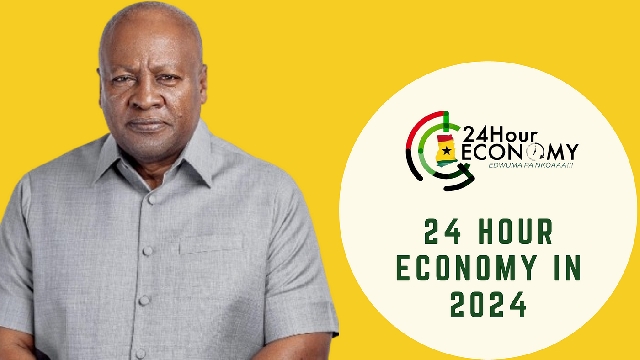President Mahama delivers on 24-hour economy promise within first 120 days
 President John Mahama
President John Mahama
President John Dramani Mahama has announced major strides in the implementation of his administration’s flagship 24-hour economy policy, fulfilling a key campaign promise within his first 120 days in office.
Speaking at a press briefing, President Mahama declared that the rollout of the ambitious policy had begun in earnest.
“We promised to commence drafting the needed legal amendments and prepare for implementation within the first 120 days — and we have delivered on that promise,” he said.
He revealed that the Cabinet has approved significant amendments to the Ghana Investment Promotion Centre (GIPC) Act and the Labour Act.
These changes, he explained, are aimed at enhancing social protection, creating a supportive legal framework for round-the-clock economic activity, and strengthening labour and business relations.
As part of the policy's early implementation, several government institutions have already transitioned to 24/7 operations with encouraging results.
“The Ghana Investment Promotion Centre has introduced 24-hour premium services to eliminate processing delays for investors,” the President reported.
“The Ministry of Foreign Affairs has rolled out a 24-hour passport service, and the Driver and Vehicle Licensing Authority (DVLA) has used extended working hours to clear an 18-month backlog of license applications.”
The policy’s employment impact is also beginning to take shape.
President Mahama announced that the Youth Employment Agency (YEA) is preparing to launch a new initiative — the Graduates in Corporate Support Programme — which will deploy 20,000 graduates to businesses operating around the clock.
To bolster security during nighttime operations, the Ghana Police Service is establishing a 24-hour police unit focused on improving night patrols and deploying advanced surveillance technology.
On the energy front, Mahama revealed that the Energy Ministry is working with the Public Utilities Regulatory Commission (PURC) to introduce smart metres with time-of-use tariffs.
These will incentivise off-peak energy use by offering reduced rates to businesses that adopt 24-hour operations.
Private sector interest in the policy has surged, with numerous businesses signalling their readiness to come on board.
“We are pursuing new avenues of job creation, expanding opportunities especially for young graduates, and positioning the private sector as a critical engine of sustainable growth,” President Mahama stated.
He emphasised that the 24-hour economy policy is designed to drive structural transformation across Ghana’s economy, targeting key sectors such as agriculture, manufacturing, and tourism.
“This programme will serve as a catalyst for long-term economic renewal,” he said, “anchored on innovation, productivity, and inclusive growth.”
Source: Classfmonline.com/Cecil Mensah
Trending Business

Muntaka Entrepreneurship Hub trains over 100 women in Asawase
14:16
Ghana Gold Board rakes in over $10bn ahead of target
09:56
GEXIM faces GHS1.5bn credit exposure as NPLs near 30% — CEO
09:36
Six Degrees delivers immersive experiential production at Kweku Smoke’s revival concert
10:37
GIPC highlights govt’s commitment to retail sector transformation at GUTA conference
03:01
Lower-Volta Small-Scale Miners & Farmers to host international livestock market
00:43
Nigeria's commercial dispute involving Ghanaian firm raises bilateral trade concerns-UK Certified Customer Communication expert warns
21:31
GoldBod Jewellery, GTA launches December homecoming promotion for diaspora visitors
17:15
Global cocoa prices soared, but Ghanaian farmers gained little – Randy Abbey
15:40
GIPC CEO joins Vice President to open new sanitary pad production line
09:23




